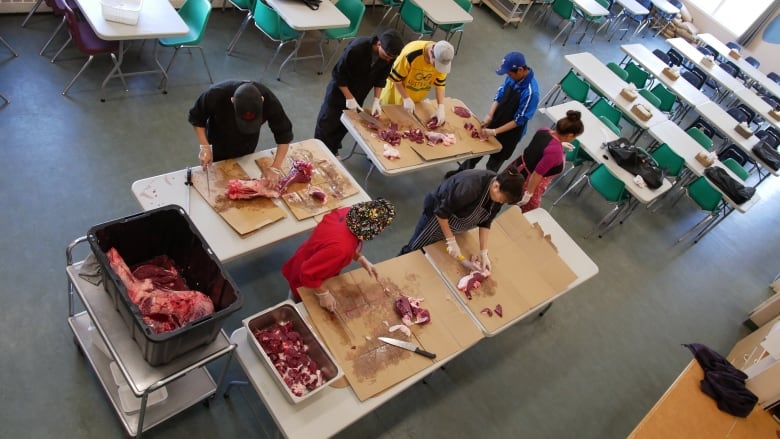Iqaluit food centre sees higher demand for meals amidst water emergency
Qajuqturvik Community Food Centre served lunch to 250 a day in first weeks of crisis

As Iqaluit continues to grapple with the water crisis that began last month, the city's community food centre said it has seen a greater demand for its services.
Nunavut's capital has been under a state of emergency since Oct. 12, when staff confirmed evidence of fuel contamination in the city's treated water supply. Residents were told the water is unsafe to drink, even if filtered or boiled.
Rachel Blais, the director of the Qajuqturvik Community Food Centre, said the organization saw a record number of residents accessing its daily meals in the first few weeks of the crisis, with around 250 people reaching out to the centre for help each day.
The number of people accessing the centre has since lowered but remains higher than before the water crisis.
According to Blais, the increased demand showsa clear link between food insecurity and the water crisis in Nunavut.
"Inuit Tapariit Kanatami (ITK) has called food insecurity amongst Inuit the longest-lasting public health emergency in Canadian history," Blais said. "We are already in a crisis when it comes to food insecurity in the North with over half of Nunavummiut currently experiencing food insecurity ... [now] with the looming threat of water insecurity as well."

According to ITK's Inuit Nunangat Food Security Strategy, Inuit in Canada experience the highest rates of food insecurity of any Indigenous population in an industrialized nation.
In order to meet the increased demand for its services, Blais said the food centre initially hired a full-time driver to help get water to residents as well.
"We saw there was a need for water delivery services for many people who didn't have access to transportation, or had mobility issues, or had many children at home and weren't able to get to the distribution points themselves," Blais said.
While the centre has since stopped delivering water, it continues to provide bottled water along with daily meals.
"We've been working with the city to make sure that we have a regular supply of water bottles that people can take when they come for our lunch service," Blais said.
Echoes of Walkerton
While Iqaluit remains in a state of emergency, Canadians like Pauline Gay are stepping in to help out.
A resident of Waterloo, Ont., Gay first heard about the water emergency through her mother.
When she watched the news on the TV, Gay said it reminded her of the Walkerton water crisis that took place in Bruce County, Ont., over two decades ago.
"My mom already lived through another water crisis in another place," Gay said. "We were supposed to learn from that."
Gay's parents had also lived in Iqaluit in the '80s, which is why she said she felt compelled to try and help out now.
"If we didn't do something, nothing was going to get done," she said.
On October 13, Gay launched a fundraiser to help Iqalummiut pay for bottled water. Fourteen donors have helped raise $600 so far. Gay's goal is to raise $10,000. The money will be donated to Qajuqturvik.
Gay said it is in times of crises that Canadians can come together and help each other out.
"We've got a lot of original infrastructure that was set up for different communities across the country that is old and ageing and needs to be replaced," she said. "People can say, 'This is a governance problem and it's the government's fault.' We realise there was somebody who dropped the ball but let's get it fixed."
Gay said those interested in helping Qajuqturvik can also donate directly to the organization.












_(720p).jpg)


 OFFICIAL HD MUSIC VIDEO.jpg)
.jpg)



























































































